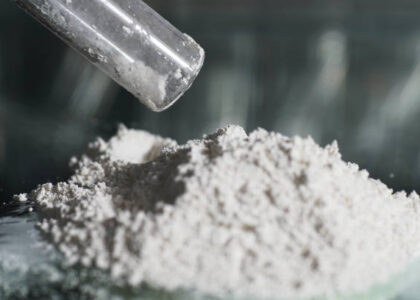What is Gout?
Gout is a form of arthritis that can affect the ears, hands, wrists, ankles, or knees. Common symptoms include pain, swelling, tenderness, and inflammation of the joints.
Although the exact cause is unknown, risk factors include genetic predisposition, lack of physical exercise, excessive alcohol consumption, high levels of uric acid, excess protein intake, and high levels of stress. Gout is also associated with other health problems including diabetes, kidney stones, and hypertension.
Natural Remedies for Gout
The following natural remedies for gout can promote healing and ease troublesome symptoms.
1. Apple Cider Vinegar
The acidity of apple cider vinegar alleviates pain and reduces inflammation.
Mix one teaspoon of raw, unfiltered apple cider vinegar in a glass of water. Drink this mixture two to three times each day to relieve pain caused by gout. You can also add honey to this remedy to increase the body’s anti-inflammatory response.
2. Baking Soda
Baking soda relieves gout by reducing the amount of uric acid in the body; uric acid is considered one of the primary causes of gout.
To ease gout pain and promote healing, mix half a teaspoon of baking soda into a glass of water and drink it up to four times a day for two weeks. If you are older than 60, you should only drink this solution three times a day.
3. Lemon Juice
The most effective natural cures for gout work by reducing levels of uric acid. Lemon juice reduces the amount of uric acid in the bloodstream, relieving gout pain and swelling.
Mix the juice from one lemon with half a teaspoon of baking soda. Once the mixture has stopped fizzing, add it to a glass of water and drink it immediately. You can also add lemon juice to your water and drink approximately three glasses of water and lemon juice each day.
4. Ginger Root
Ginger root’s anti-inflammatory properties make it beneficial for easing gout symptoms. Ginger root can be consumed fresh, powdered, as juice, in oil form, or dried as a spice. Ginger root is an herbal remedy that can help soothe the pain and swelling associated with gout.
5. Apples
Apples contain malic acid, which reduces uric acid in the body. The malic acid found in apples reduces swelling and relieves pain associated with gout.
6. Epsom Salt
Epsom salt contains high levels of magnesium. Soaking sore joints in a mixture of Epsom salt and warm water can help ease the pain and swelling associated with gout.
7. Cherries
Cherries are rich in antioxidants and anthocyanins, which reduce inflammation and minimize gout flare-ups. It is recommended that gout patients eat at least 15 to 20 cherries each day. Drinking black cherry juice, or taking cherry juice extract, is also an option.
Cherries significantly reduce the risk of gout flare-ups by reducing inflammation and decreasing uric acid buildup in the body.
8. Fish Oil
Fish oil won’t act as quickly as the other natural remedies for gout on this list. Over time, however, fish oil reduces your risk of gout flare-ups by reducing inflammation throughout the body. The omega-3 fatty acids contained in fish oil ease inflammation associated with gout and a range of other health conditions.
9. Celery Seed Extract
Celery seed extract and celery juice have been proven to reduce uric acid in the bloodstream. Celery contains a variety of antioxidants that reduce inflammation throughout the body. Therefore, celery is beneficial for treating a range of conditions that are worsened by inflammation, including gout.
Celery seed oil is available in supplement form. You can also make celery juice with a vegetable juicer, or simply eat celery throughout the day.
10. Nettles
Nettles are available in tea form or as a supplement. Nettles are an herbal remedy that relieves gout by reducing inflammation.
11. Magnesium
Magnesium is an alkaline mineral that decreases the body’s production of uric acid. High levels of uric acid are known to cause gout, so magnesium is highly effective for treating and helping prevent gout.
Magnesium deficiency is surprisingly common. Symptoms include muscle aches or spasms, digestive issues, anxiety, and trouble sleeping.
If you have gout and/or symptoms of magnesium deficiency, add magnesium-rich foods to your diet and consider magnesium supplements. Spinach, Swiss chard, almonds, pumpkin seeds, dark chocolate, avocado, figs, black beans, yogurt, and bananas are all high in magnesium.
Magnesium supplements are available in a variety of forms. An expert can help you determine which type of magnesium supplement would be most effective for relieving your individual symptoms.
12. Bananas
Bananas contain high levels of potassium. Potassium converts uric acid crystals in the body into liquid form. Uric acid can then be expelled from the body through urination. Because high levels of uric acid are linked to gout, the potassium in bananas can help relieve gout by reducing uric acid.
Bananas also contain vitamin C, which reduces the pain and swelling associated with gout.
13. Activated Charcoal
Activated charcoal reduces the effects of gout on the body by absorbing uric acid. One option is to soak in a bath with half a cup of charcoal powder. Another option is to create a paste using charcoal powder and water, then apply the paste to the affected area.
14. Cold Water
Cold compresses can help reduce swelling, but don’t make the mistake of applying ice to areas affected by gout. Ice is not only ineffective for treating gout, but it can also damage the skin and make the condition even worse.
To relieve pain and swelling caused by gout, soak the affected areas in cold water, rather than using ice.
15. Exercise
Exercise reduces levels of uric acid in the body by normalizing insulin levels. As a result, exercise can help reduce the frequency and severity of gout flare-ups.
16. Hydration
Staying hydrated by drinking plenty of water is essential for relieving gout. Adequate hydration helps flush excess uric acid out of the body.
17. Rest
Rest the affected areas until your joint pain eases up. You might also find it helpful to elevate the affected area using a pillow.
When to Seek Treatment
If this is your first gout flare-up, you should seek medical attention to ensure you’re actually experiencing gout and not another condition that causes similar symptoms. You should also seek treatment if you have a high fever and chills because this could be a sign of an infection.
If your symptoms don’t improve at all after 48 hours or persist for more than one week, you should consult with your doctor to see if a different treatment is needed.
An experienced medical professional can help you decide which natural remedies for gout would be best for you.










